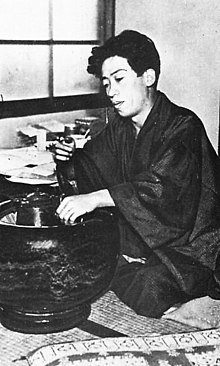Takiji Kobayashi
| Takiji Kobayashi | |
|---|---|

Takiji Kobayashi
|
|
| Native name | 小林 多喜二 |
| Born |
October 13, 1903 Odate, Akita, Japan |
| Died | February 20, 1933 (aged 29) Tokyo, Japan |
| Occupation | Writer |
| Genre | novels |
| Literary movement | proletarian literature |
Takiji Kobayashi (小林 多喜二 Kobayashi Takiji?, October 13, 1903 – February 20, 1933) was a Japanese author of proletarian literature. He is best known for his short novel Kanikōsen, or Crab Cannery Ship, a short novel published in 1929. It tells the story of several different people and the beginning of organization into unions of fishing workers. The young writer apparently died due to violent torture after arrest by the Tokkō police two years later, at the age of 29.
Kobayashi was born in Odate, Akita, Japan. At the age of four, his family moved to Otaru, Hokkaido. The family was not wealthy, but Kobayashi's uncle paid his schooling expenses and he was able to attend Hokkaido Otaru Commercial High School and Otaru Commercial School of Higher Learning, which is the current Otaru University of Commerce. While studying, he became interested in writing, and submitted essays to literary magazines, served in the editorial committee for his school's alumni association magazine, and also had his own writing published. One of his teachers at school was economist, critic, and poet Nobuyuki Okuma. Around this time, due to financial hardship and the current economic recession of the time, he joined the labour movement.
After graduating from school, he worked in the Otaru branch of the Hokkaido Takushoku Bank. In the 1928 general election, Kobayashi helped with election candidate Kenzo Yamamoto's campaign, and went to Yamamoto's campaign speech in a village at the base of Mount Yōtei. This experience was later incorporated into his book Higashikutchankō (東倶知安行?). In the same year, his story March 15, 1928 (based on the March 15 incident) was published in the literary magazine Senki ("Standard of Battle" in Japanese). The story depicted torture by the Tokkō special higher police, which in turn infuriated government officials.
...
Wikipedia
